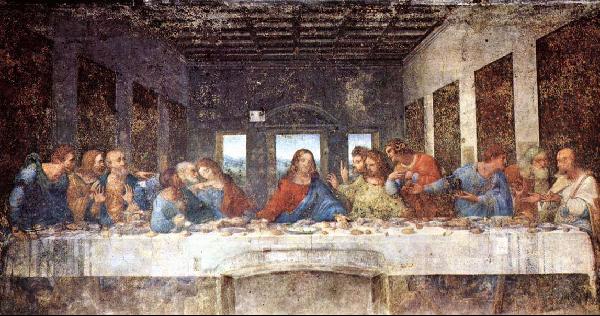Today I received an E-mail from Touchstone Magazine regarding today’s date in the Church year calendar. Today is Maundy Thursday. I would like to reproduce that E-mail below for your reading pleasure. Also, please refer to my wife’s post about Maundy Thursday for a brief explanation of the day.
======================
Prayer
Lord Jesus Christ, brightness of the Father’s glory and the express image of His person, who, having purged our sins, entered once into the holy place and sat down at the right hand of the majesty on high; mercifully bend our stiffened necks, we beseech You, and temper our rebellious hearts before the unspeakable mystery of Your compassion, for we ask this in Your holy name. Amen.
“Maundy,” the unusual adjective descriptive of this day, comes from the Latin mandatum, meaning “commandment,” because this is the day on which the Lord gave the “new commandment” that we are to love one another. On this day He exemplified this love by washing the disciples’ feet and also instituted the Lord’s Supper, in which all of us who share the one bread are made one body in Christ.
In many Christian bodies, following a tradition that apparently goes back to apostolic times, believers are disposed and inspired to spend at least an hour of this night, and in some cases the whole night, in prayer, remembering that Jesus Himself did so and likewise encouraged His disciples to “watch” with Him. In some monastic communities, this is a public liturgical service, and in some Roman Catholic and Anglican parishes the night is hourly divided among members to make sure that prayer is being offered in church all night long. Many other Christians keep such watch in their own homes.
March 20
Matthew 26:17-56: We come now to Holy Thursday and the evening of the Last Supper. The traditions behind the four gospels attach several stories to the narrative of the Last Supper. These include the story of Jesus washing the feet of the disciples, a saying of Jesus relative to His coming betrayal, a prophecy of Peter’s threefold denial, various exhortations and admonitions by Jesus, and a description of the institution of the Holy Eucharist.
There are considerable differences among the four evangelists with respect to their inclusion of these components. Thus, only John describes the foot-washing, though Luke 22:24-30 includes a dominical admonition which would readily fit such a context. With respect to the actual teachings and exhortations of Jesus during the supper, John’s account is by far the longest, stretching over several chapters.
Only two of the stories are told in all four gospels. First, there is some reference by Jesus to His betrayal. In Matthew and Mark this comes before the institution of the Holy Eucharist; in Luke it comes afterwards, in John it immediately follows the foot-washing. Only in Matthew and John is Judas actually identified by Jesus. Luke and John ascribe the betrayal to the influence of Satan.
Second, all four gospels include a prophecy of Peter’s threefold denial. All of them, likewise, narrate the fulfillment of that prophecy.
The Church chiefly remembers the Last Supper, however, as the occasion of the instituting of the Holy Eucharist, and it seems a point of irony that this story does not appear in John. Perhaps he felt that this important subject had been adequately treated in the Bread of Life discourse in chapter 6.
To the three Synoptic accounts of the Holy Eucharist we must add that in 1 Corinthians 11, which is at least a decade older than the earliest of the four gospels. Indeed, this narrative recorded by St. Paul links the institution of the Eucharist explicitly to the betrayal by Judas: “I received from the Lord that which I also delivered to you: that the Lord Jesus on the night in which He was betrayed took bread . . .” This text provides clear evidence that the traditional narrative contained in the Eucharistic prayer, as it was already known to Paul when he founded the Corinthian church about A.D. 50, made mention of Judas’s betrayal. That same formula or its equivalent–“on the night He was betrayed”–is found in both the liturgies of St. Basil and St. John Chrysostom.
The Church’s testimony on this point is remarkable. It is as though some deep impulse discourages Christians from celebrating the Holy Communion without some reference to the betrayal by Judas. This reference serves to remind Christians of the terrible judgment that surrounds the Mystery of the Altar: “Therefore whoever eats this bread or drinks the cup of the Lord in an unworthy manner will be guilty of the body and blood of the Lord. But let a man examine himself, and so let him eat of the bread and drink of the cup. For he who eats and drinks in an unworthy manner eats and drinks judgment to himself, not discerning the Lord’s body” (1 Corinthians 11:27-29).

Continue reading Maundy Thursday: The Last Supper & The Agony in the Garden

